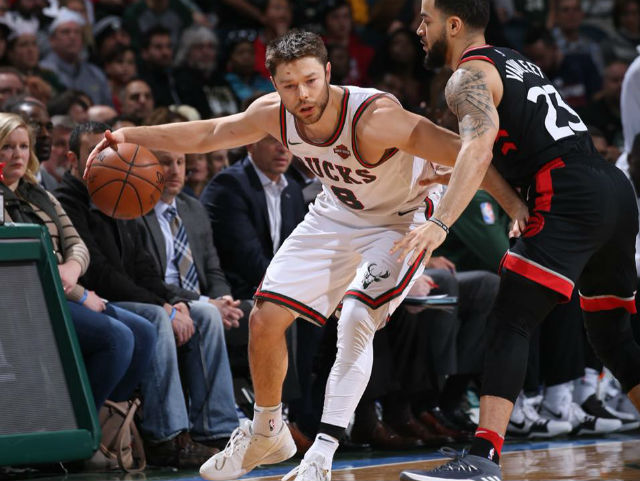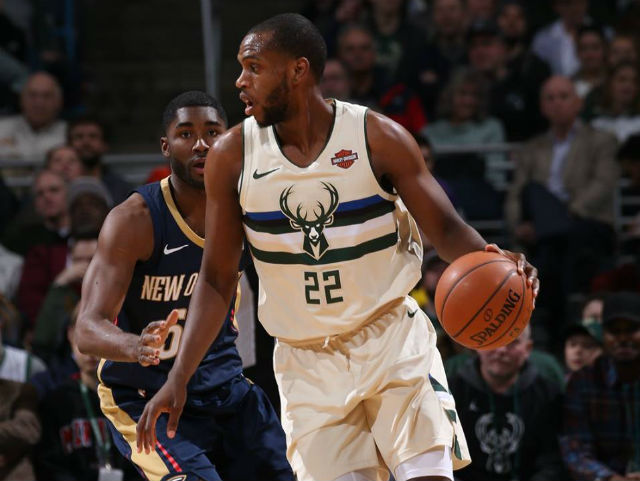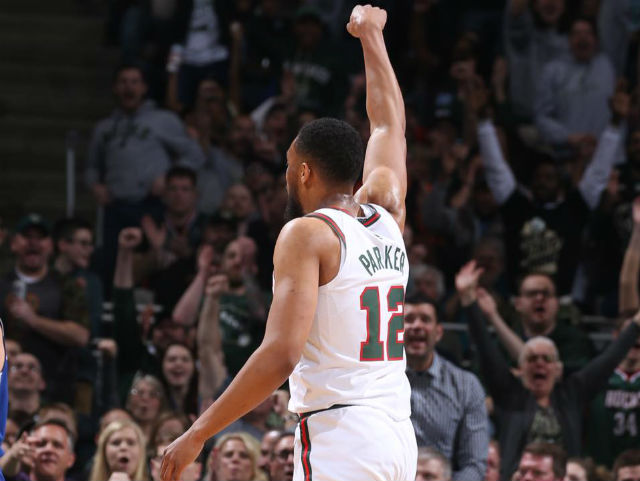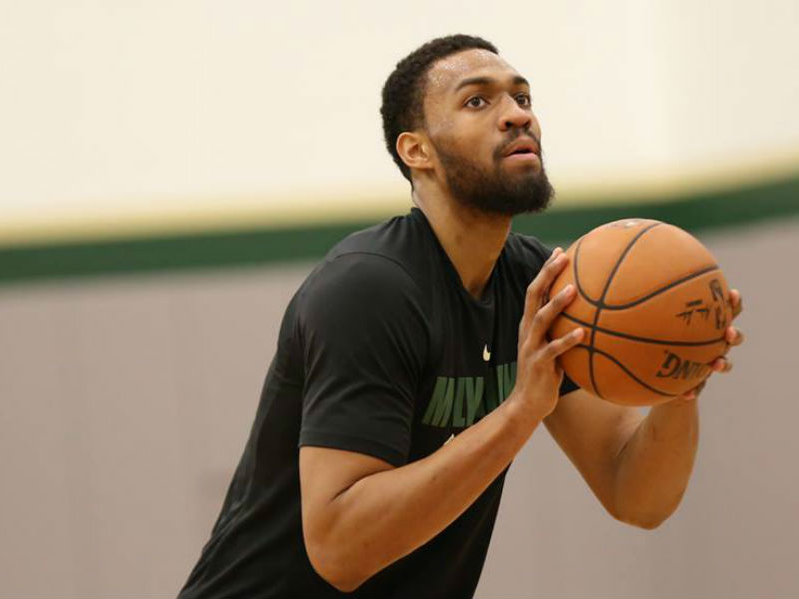In the big-money world of major professional sports, it’s no secret that players don’t have to pay for much. Fresh gear from sponsors, comped meals at restaurants, new cars from dealerships, team-allotted game tickets for family and friends. It’s all part of the deal. But that bankrolled reality is a big reason why the Milwaukee Bucks’ little-known Players Community Ticket Program is so remarkable.
Every time the Bucks play a home game, on average about 100 kids from local community organizations attend for free – also receiving transportation and a meal at the BMO Harris Bradley Center – thanks to a handful of players, who personally pay to offer a unique and memorable experience for the specifically selected groups of Milwaukee children who otherwise might not get such an opportunity.
Now in its third official year, the Bucks’ Players Community Ticket Program has reached new heights, in terms of participation, dollar amount, number of tickets purchased and organizations supported. Led, unsurprisingly, by Jabari Parker, five players spent a total of $71,800 to buy 3,980 tickets for 10 local youth groups this season, according to private figures the Bucks provided to OnMilwaukee.
Besides Parker, guards Matthew Dellavedova, Tony Snell, Eric Bledsoe and Khris Middleton made the largest contributions in 2017-18. A couple of additional players participated at a lower level, as well as Greg Monroe, whose generous obligation was fulfilled by the franchise after he was traded to the Phoenix Suns in November. In all, nearly half the roster has been involved this season.
The program is voluntary, according to Alicia Dupies, the Bucks’ vice president of corporate social responsibility and executive director of their Foundation, and the tickets players buy are separate from their team allotment of three or four, with the money coming out of their paychecks.
"This is not a forced initiative, as much as it's trying to be an informed and impactful one," she said.

After Dupies’ first season in 2015-16, in an effort to boost low redemption rates, the Bucks expanded the ticket program to make it easier for the organizations and more of a comprehensive experience for their youth. They adjusted the investments to include transportation – whether by buses or vans – and a meal voucher.
"The shift was to go from just, ‘Hey, here's a ticket, come watch us play,’ to ‘Hey, we want you to be a part of the movement, the Bucks movement, and we realize that there are some challenges, so let's figure out how to get you there and to allow you to have something to eat while you're there too,’" said Dupies, adding that the voucher does not permit soda, her own health-minded addendum that would make Michelle Obama smile.
"We have definitely seen the usage rates go up, which is exactly what we had hoped for."
While the Bucks are not the only NBA team with a player tickets program, they’re proud that their version allows customization. The players individually choose the community groups they want to support, rather than just picking off some list the Bucks hand them, with the player development team and the front office then working together to create a fit. It’s a "humanized approach," Dupies said, and it’s important because many players grew up using certain organizations, have special connections there and want to give back to them.
"I don't think that there's one size fits all," she said. "When I first came on board with the team, I tried to kind of see if there was a recipe to follow, but at the end of the day we're talking about 15 men, adults who have different stories of their own and should be allowed to invest their money back into our community’s needs in the way that they want."
Dupies said next season, in addition to the current participants, other players will join, after having "gotten to know Milwaukee a little bit better."
As an example, she mentioned Dellavedova, who didn’t participate in the program last year because the free-agent signee was new to Milwaukee and trying to figure out how best to contribute to the community. He soon settled on the local academic support and enrichment organization Our Next Generation, with which he had developed a relationship, using the incentivized ticket program to establish reading goals.

Dellavedova said the Bucks’ community staff "makes it easy for us," taking a player’s vision and ideas of how they want to help and "really communicating that" to the various organizations with whom they could partner.
"You know, it’s great to give kids tickets so they can come to a game, but to do something that’s really going to make an impact and help improve their situation, something that provides benefit down the road, that’s what I’ve been really impressed with," Dellavedova said. "Alicia’s as passionate as they come. The Bucks are doing a great job in the community, and they do a great job from a player’s perspective in helping us to make the most impact we can with the time and resources that we have."
Dellavedova’s $10,800 contribution paid for 600 tickets this season for the mostly elementary-aged children at the after-school group. Through Delly’s Deer Reading Program, top-20 readers receive not one ticket to a game, but four, and the next 30 get two tickets each, equaling roughly 140 per game.
"He was like, ‘I want them all to come together; this should be a celebration,’" Dupies said. "He wanted the camaraderie of the group to be translated into the whole game experience."
Last week, some of the top readers also got to visit the Bucks’ practice facility, take a tour and even shoot hoops on the court. Additionally, there’s a mentoring component to Dellavedova's Our Next Generation involvement, in which students receive tutoring at the Bucks’ Schlitz Park offices, including from his wife Anna, who’s a teacher.

In the case of Bledsoe, acquired by the Bucks four months ago in the Monroe trade, he wanted to donate immediately but wasn’t well-acquainted with the local landscape. The Bucks connected the point guard with a number of groups, and his $10,000 paid for 550 tickets, which have gone to the Running Rebels, COA Youth & Family Centers, Operation DREAM and Next Door Foundation, helping satisfy commitments of other players that are no longer with the team.
In his second year on Milwaukee, Snell – quietly one of the Bucks’ most altruistic players in both money and time, according to Dupies – has contributed $10,000 and 550 tickets to Silver Spring Neighborhood Center and Pathfinders, a local youth shelter organization. Saying, "Oh gosh, I can't even articulate how wonderful Tony is," Dupies noted that kids at Silver Spring Neighborhood Center have sent some of the "most terrific thank-you notes" to Snell.

Middleton, who’s been with the Bucks since 2013, spent $6,000 this season on 330 tickets for kids involved with Big Brothers Big Sisters of Metro Milwaukee – one of his favorites groups – and Playworks Wisconsin, which helps kids stay active and build social and emotional skills through recreation.
"It’s a good way to say thanks for everything they’re doing in the community and let them watch a game," Middleton said, laughingly denying there’s any competition among the players about who donates the most tickets. "It’s all about giving back and putting smiles on kids’ faces."

Acknowledging that any and all Bucks contributions are meaningful, one player still stands above the rest. In his third year with the team and third year partnering with Milwaukee Public Schools to promote student attendance, Parker bought more than three times as many tickets as anyone else on the team, spending $35,000 on 1,950 seats for children at 34 different MPS schools, particularly middle and high schools. Given how Parker has publicly advocated for schools and has a close relationship with MPS Superintendent Dr. Darienne Driver, Dupies said, "it was a natural alignment" for the Players Community Ticket Program.
"When it was presented to me, it was a no-brainer," Parker said. "I wanted to do it right then and there. It’s been helpful for me and helpful for the kids too, and what I stand for and my motivation with the public schools system, giving them a reward."
With a $6.8 million salary this season, Parker certainly makes a lot of money. But, while he’s been criticized at times for turning down a team-friendly contract extension last fall, he’s still only Milwaukee’s eighth-highest-paid player – and, for someone who’s suffered two serious knee injuries already in his short career and has no guarantees of future health, his generosity is significant.

"I mean, it’s a big contribution," Parker said, "but at the end of the day, how much money do you really need? Like, I’m fine, my parents are fine; what makes more of a difference is just helping people that can’t always do for themselves, that won’t be able to experience what I’m able to experience.
"So the more exposure you can give kids, the better, and the more enlightenment they have and the more culture they get, that’s all it is. Trying to give them that experience, that’s priceless. You can’t put a price tag on that – and, for the price tag that it takes, it’s pretty cheap."
Which games and how many seats are used for each depends on factors like the player’s donation level, when the tickets were bought and the organization’s programming schedule. In Parker’s case, with nearly 2,000 purchased, he has MPS students in attendance at every Bucks home game – usually weeknights for school groups, weekends for athletic teams.
He’s participated in the program for the last three years, even though, as Dupies pointed out, he tore his ACL midway through last season and was still sidelined when the 2017-18 campaign began. Nevertheless, he increased his already-impressive ticket commitment this season.
"He kept investing in the program and in MPS," Dupies said. "And he’ll talk to students, like, ‘Hope to see you at a game,’ and that sort of consistency and visibility with the population that needs to hear that kind of support from a superstar like Jabari is so great."
Said Parker, "I do get a chance to interact with the kids, usually before the game or after the game, and also visiting their schools. It’s not one-sided; I always take something from it too."
According to Dupies, even when the Bucks move into their new arena next year – a world-class venue that presumably will strain the supply of available seats – the Players Community Ticket Program will continue and, she believes, grow larger.
"One of the things that we would like to do is get them in the habit of giving back," Dupies said. "And these guys, as leaders, are the best examples for some of the younger players because I think that you could see how much Jabari really enjoys it – all of them do.
"I think, if anything, the intent is only to increase the engagement and involvement by the players going forward."
Born in Milwaukee but a product of Shorewood High School (go ‘Hounds!) and Northwestern University (go ‘Cats!), Jimmy never knew the schoolboy bliss of cheering for a winning football, basketball or baseball team. So he ditched being a fan in order to cover sports professionally - occasionally objectively, always passionately. He's lived in Chicago, New York and Dallas, but now resides again in his beloved Brew City and is an ardent attacker of the notorious Milwaukee Inferiority Complex.
After interning at print publications like Birds and Blooms (official motto: "America's #1 backyard birding and gardening magazine!"), Sports Illustrated (unofficial motto: "Subscribe and save up to 90% off the cover price!") and The Dallas Morning News (a newspaper!), Jimmy worked for web outlets like CBSSports.com, where he was a Packers beat reporter, and FOX Sports Wisconsin, where he managed digital content. He's a proponent and frequent user of em dashes, parenthetical asides, descriptive appositives and, really, anything that makes his sentences longer and more needlessly complex.
Jimmy appreciates references to late '90s Brewers and Bucks players and is the curator of the unofficial John Jaha Hall of Fame. He also enjoys running, biking and soccer, but isn't too annoying about them. He writes about sports - both mainstream and unconventional - and non-sports, including history, music, food, art and even golf (just kidding!), and welcomes reader suggestions for off-the-beaten-path story ideas.







